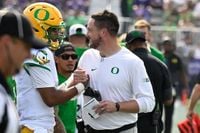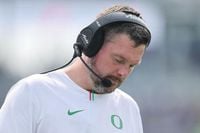Oregon football coach Dan Lanning could have used Saturday night to bask in his team’s impressive 34-14 victory over Northwestern in their Big Ten opener. Instead, the 39-year-old head coach stepped to the podium and delivered a message that transcended the scoreboard, addressing the nation’s fractured state and the tragic assassination of conservative activist Charlie Kirk. The Ducks’ win moved them to 3-0 on the season, but Lanning’s postgame speech quickly became more than just a recap of football success—it was a rallying cry for unity, empathy, and national healing.
“You walk in that locker room, you’ve got guys of different races, guys of different backgrounds, different religions, and you got a team that loves each other. Tons of differences. Where they come from, what they deal with, and ultimately you’ve got a team that loves each other, and I think we’re missing some of that in our country,” Lanning said, his words echoing through the press room after learning of Kirk’s death.
The assassination of Charlie Kirk on September 10, 2025, during an appearance at Utah Valley University in Orem, Utah, sent shockwaves through the political and sports worlds alike. Kirk, a prominent right-wing activist and founder of Turning Point USA, was gunned down in a moment that has since become a flashpoint in debates over gun violence and political division. The suspect, 22-year-old Tyler James Robinson of Washington, Utah, was arrested on suspicion of aggravated murder and other felony offenses. Authorities revealed that the ammunition used in the shooting was engraved with anti-fascist slogans and meme-culture taunts, a chilling detail that underscored the ideological tensions surrounding the case.
For Lanning, the news hit home in an unexpected way. He’d only recently discovered that Kirk was a passionate Oregon fan, even attending a Ducks game with his wife, Erika. That personal connection, however slight, lent an even more tragic air to the violence. “I hurt for his wife, Erika, and their kids. That sort of evil should never exist in our country, and that’s what it is—evil,” Lanning stated. He recounted the painful experience of explaining the tragedy to his own children, who were already hearing about it at school. “It’s just sad, right? But it’s just as sad—every day it seems like we deal with some sort of violence that’s going on in our country, whether it’s school kids in Colorado or kids in Minnesota at churches. I mean, life matters, and I think we’ve lost sight of that.”
Robinson’s arrest brought further disturbing revelations. According to Utah Governor Spencer Cox, Robinson’s family told authorities that he had become “more political in recent years,” with dinner table conversations sometimes centering on Kirk’s upcoming visit to Utah Valley University and whether the activist was spreading hate. State records show Robinson as an inactive voter not affiliated with any political party, while his parents are registered Republicans. Social media chats obtained by investigators showed Robinson mocking the FBI manhunt and joking about the investigation before surrendering, displaying a lack of remorse and a penchant for gallows humor.
The aftermath of Kirk’s death has been marked by national mourning and a call for reflection. Moments of silence were held at MLB and NFL games on September 10 and 11, and again at college football games across the country the following Saturday. Kirk’s casket was returned to Arizona aboard Air Force Two, accompanied by Vice President JD Vance, a testament to his stature in conservative circles. A public memorial is scheduled for September 21 at State Farm Stadium in Phoenix, where the Arizona Cardinals play. Erika Kirk, his widow, has vowed to continue her husband’s campus tour and his radio and podcast shows, promising, “The movement my husband built will not die.”
Lanning’s speech, nearly four minutes long, was both a plea and a challenge. He acknowledged that some would disagree with his comments, but stood firm: “There’s some people that’ll be disappointed about how much I said about this, right? And there’ll be people that are disappointed that I didn’t say enough, right? And I don’t really care. What I do care about is, if you disagree with me, if you hate me, if you don’t like me, just know this—I love you. I absolutely love you, right? And life matters.”
This wasn’t the first time Lanning used his platform to address social issues. After a mass shooting in Lewiston, Maine, in 2023, he spoke out against gun violence, emphasizing the need for compassion and common sense. On Saturday, he doubled down, calling for reforms to protect children and address both mental health and gun access. “Our kids should be the most protected thing in the world. They should have armed guards at every school, because there are sick people in this world. And those sick people need help, but it should be really hard for a sick person to have a gun,” Lanning argued, blending urgency with empathy.
His remarks resonated far beyond the Oregon fan base. Across the college football landscape, commentators and broadcasters echoed similar sentiments. On ESPN’s “College GameDay,” Pat McAfee remarked on how sports can unite people from all walks of life, if only for a few hours on a Saturday. “All week we’ve seen and heard maybe a lot more than we ever should about what separates us and what makes us different and our differing opinions,” McAfee said, “but on this beautiful campus on glorious Saturday, you’ll see 102,000-plus in the eighth-largest stadium in the world from different economic backgrounds, political backgrounds, religious backgrounds, you name it, all coming together for one thing.”
Lanning’s message was clear: the unity found in a locker room—where players of every race, religion, and background come together for a common goal—should serve as a microcosm for the nation. “I wish the world could learn a little bit of something from our locker room, because we’ve got a bunch of people with differences, and what you’ve got in there is a bunch of people there,” he said. He even admitted that while there were things about Kirk’s views he disagreed with, he could still respect those differences. “There’s a lot of things that Charlie said that I did not agree (with) at all. There’s a lot of things he said that I did agree with. But what is disappointing is, I could respect those differences, and somebody else couldn’t.”
For the Oregon Ducks, the win over Northwestern was another step toward a promising season. But for Lanning, Saturday night’s victory was overshadowed by a greater purpose: using the spotlight to challenge the country to embrace empathy, reject violence, and rediscover the value of life. As the nation prepares for Kirk’s memorial and continues to grapple with the aftermath of another senseless act, Lanning’s words offer a hopeful reminder that the lessons learned on the field can—and should—extend far beyond it.


